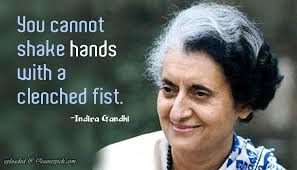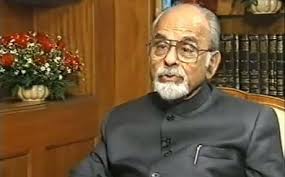Click the image to view more information about the Leader.
DOB:14 November 1889 / DOD:27 May 1964
15 August 1947 to 27 May 1964 - 16 years, 286 days
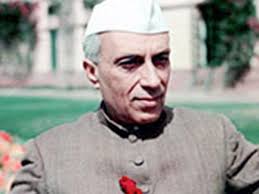
Jawaharlal Nehru (14 November 1889 - 27 May 1964) was the first Prime Minister of India and a central figure in Indian politics for much of the 20th century. He emerged as the paramount leader of the Indian independence movement under the tutelage of Mahatma Gandhi and ruled India from its establishment as an independent nation in 1947 until his death in office in 1964. Nehru is considered to be the architect of the modern Indian nation-state: a sovereign, socialist, secular, and democratic republic. During his lifetime, he was popularly known as Pandit Nehru ("Scholar Nehru") or as Panditji ("Respected Scholar"), while many Indian children knew him as "Uncle Nehru" (Chacha Nehru).
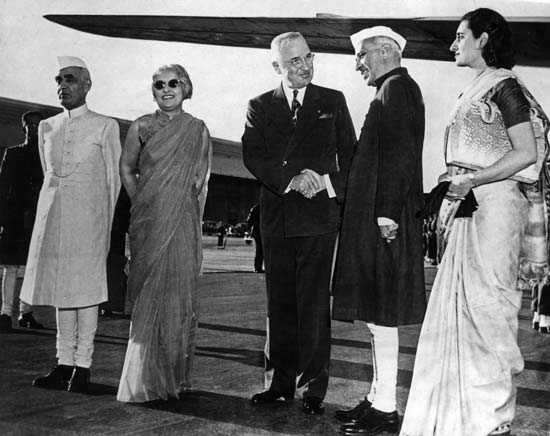 The son of Motilal Nehru, a prominent lawyer and nationalist statesman and Swaroop Rani, Nehru was a graduate of Trinity College, Cambridge and the Inner Temple, where he trained to be a barrister. Upon his return to India, he enrolled at the Allahabad High Court, and took an interest in national politics, which eventually replaced his legal practice. A committed nationalist since his teenage years, Nehru became a rising figure in Indian politics during the upheavals of the 1910s. He became the prominent leader of the left-wing factions of the Indian National Congress during the 1920s, and eventually of the entire Congress, with the tacit approval of his mentor, Gandhi. As Congress President in 1929, Nehru called for complete independence from the British Raj and instigated the Congress's decisive shift towards the left.
The son of Motilal Nehru, a prominent lawyer and nationalist statesman and Swaroop Rani, Nehru was a graduate of Trinity College, Cambridge and the Inner Temple, where he trained to be a barrister. Upon his return to India, he enrolled at the Allahabad High Court, and took an interest in national politics, which eventually replaced his legal practice. A committed nationalist since his teenage years, Nehru became a rising figure in Indian politics during the upheavals of the 1910s. He became the prominent leader of the left-wing factions of the Indian National Congress during the 1920s, and eventually of the entire Congress, with the tacit approval of his mentor, Gandhi. As Congress President in 1929, Nehru called for complete independence from the British Raj and instigated the Congress's decisive shift towards the left.
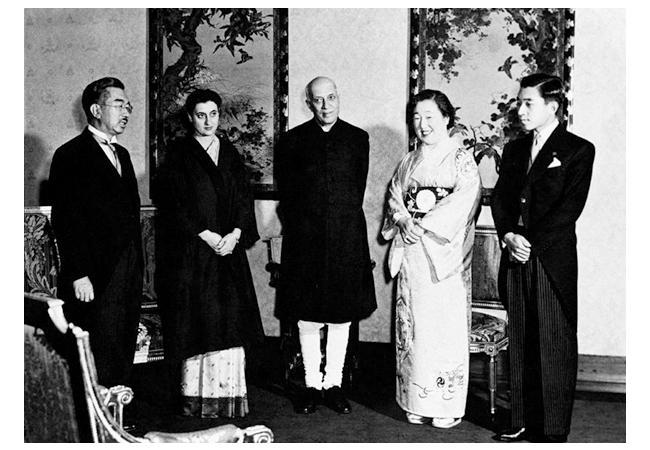 Nehru and the Congress dominated Indian politics during the 1930s as the country moved towards independence. His idea of a secular nation-state was seemingly validated when the Congress, under his leadership, swept the 1937 provincial elections and formed the government in several provinces; on the other hand, the separatist Muslim League fared much poorer. But these achievements were seriously compromised in the aftermath of the Quit India Movement in 1942, which saw the British effectively crush the Congress as a political organisation. Nehru, who had reluctantly heeded Gandhi's call for immediate independence, for he had desired to support the Allied war effort during the Second World War, came out of a lengthy prison term to a much altered political landscape. The Muslim League under his old Congress colleague and now bete noire, Muhammad Ali Jinnah, had come to dominate Muslim politics in India. Negotiations between Nehru and Jinnah for power sharing failed and gave way to the independence and bloody partition of India in 1947.
Nehru and the Congress dominated Indian politics during the 1930s as the country moved towards independence. His idea of a secular nation-state was seemingly validated when the Congress, under his leadership, swept the 1937 provincial elections and formed the government in several provinces; on the other hand, the separatist Muslim League fared much poorer. But these achievements were seriously compromised in the aftermath of the Quit India Movement in 1942, which saw the British effectively crush the Congress as a political organisation. Nehru, who had reluctantly heeded Gandhi's call for immediate independence, for he had desired to support the Allied war effort during the Second World War, came out of a lengthy prison term to a much altered political landscape. The Muslim League under his old Congress colleague and now bete noire, Muhammad Ali Jinnah, had come to dominate Muslim politics in India. Negotiations between Nehru and Jinnah for power sharing failed and gave way to the independence and bloody partition of India in 1947.
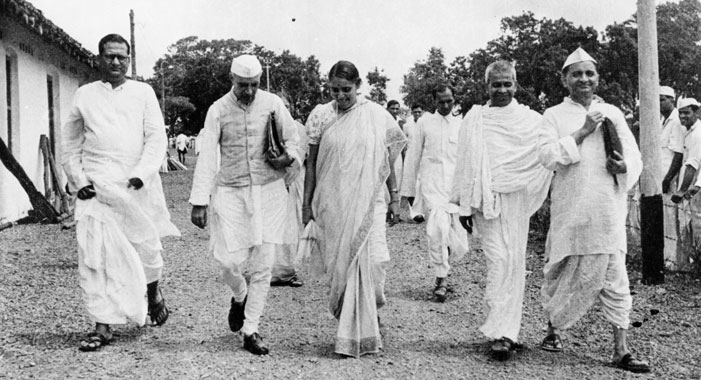 Nehru was elected by the Congress to assume office as independent India's first Prime Minister, although the question of leadership had been settled as far back as 1941, when Gandhi acknowledged Nehru as his political heir and successor. As Prime Minister, Nehru set out to realise his vision of India. The Constitution of India was enacted in 1950, after which he embarked on an ambitious program of economic, social and political reforms. Chiefly, he oversaw India's transition from a monarchy to a republic, while nurturing a plural, multi-party democracy. In foreign policy, Nehru took a leading role in Non-Alignment while projecting India as a regional hegemon in South Asia.
Nehru was elected by the Congress to assume office as independent India's first Prime Minister, although the question of leadership had been settled as far back as 1941, when Gandhi acknowledged Nehru as his political heir and successor. As Prime Minister, Nehru set out to realise his vision of India. The Constitution of India was enacted in 1950, after which he embarked on an ambitious program of economic, social and political reforms. Chiefly, he oversaw India's transition from a monarchy to a republic, while nurturing a plural, multi-party democracy. In foreign policy, Nehru took a leading role in Non-Alignment while projecting India as a regional hegemon in South Asia.
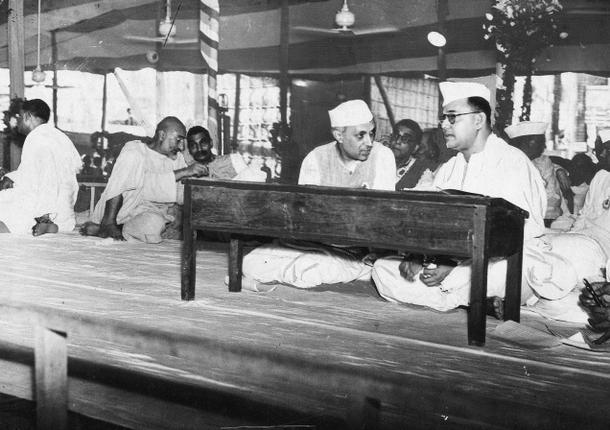 Under Nehru's leadership, the Congress emerged as a catch-all party, dominating national and state-level politics and winning consecutive elections in 1951, 1957, and 1962. He remained popular with the people of India in spite of political troubles in his final years and failure of leadership during the 1962 Sino-Indian War. In India, his birthday is celebrated as Children's Day.
Under Nehru's leadership, the Congress emerged as a catch-all party, dominating national and state-level politics and winning consecutive elections in 1951, 1957, and 1962. He remained popular with the people of India in spite of political troubles in his final years and failure of leadership during the 1962 Sino-Indian War. In India, his birthday is celebrated as Children's Day.
DOB: 4 July 1898 / DOD: 15 January 1999
27 May 1964 to 9 June 1964 - 13 days
11 January 1966 to 24 January 1966 - 13 days
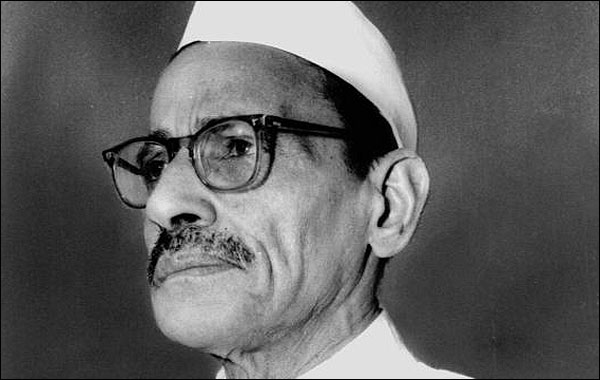
Gulzarilal Nanda (4 July 1898 - 15 January 1999) was an Indian politician and Economist who specialized in labour issues. He was the Prime Minister of India for two short periods following the deaths of Jawaharlal Nehru in 1964 and Lal Bahadur Shastri in 1966. Both his terms ended after the ruling Indian National Congress's parliamentary party elected a new prime minister. He was awarded the Bharat Ratna, India's highest civilian award, in 1997.

Nanda was born on 4 July 1898 in Sialkot in the Punjab Province of British India into a Punjabi Hindu family. (After the partition of British India into India and Pakistan in 1947, Sialkot became a part of the Punjab Province of Pakistan.) Nanda received his education in Lahore, Amritsar, Agra, and Allahabad.[citation needed]

Nanda worked as a research scholar on labour problems at Allahabad University (1920-1921), and became a Professor of Economics at National College in Bombay (Mumbai) in 1921.[citation needed] The same year, he joined the Indian Non-Cooperation Movement against the British Raj. In 1922, he became secretary of the Ahmedabad Textile Labour Association where he worked until 1946. He was imprisoned for Satyagraha in 1932, and again from 1942 to 1944. He honored with "Proud Past Alumni" in the list of 42 members, from "Allahabad University Alumni Association", NCR, Ghaziabad (Greater Noida) Chapter 2007-2008 registered under society act 1860 with registration no. 407/2000.

He married Lakshmi, with whom he had two sons and a daughter.
DOB: 2 October 1904/ DOD:11 January 1966
9 June 1964 to 11 January 1966 - 1 year,216 days
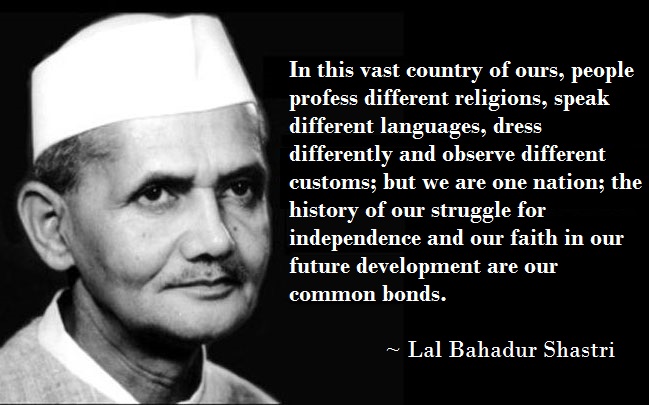
Lal Bahadur Shastri About this sound listen was the Second Prime Minister of the Republic of India and a leader of the Indian National Congress party.
 Shastri joined the Indian independence movement in the 1920.Deeply impressed and influenced by Mahatma Gandhi, he became a loyal follower, first of Gandhi, and then of Jawaharlal Nehru. Following independence in 1947, he joined the latter's government and became one of Prime Minister Nehru's principal lieutenants, first as Railways Minister (1951-56), and then in a variety of other functions, including Home Minister. Shastri was chosen as Nehru's successor owing to his adherence to Nehruvian socialism after Nehru's daughter Indira Gandhi turned down Congress President K. Kamaraj's offer of premiership.
Shastri joined the Indian independence movement in the 1920.Deeply impressed and influenced by Mahatma Gandhi, he became a loyal follower, first of Gandhi, and then of Jawaharlal Nehru. Following independence in 1947, he joined the latter's government and became one of Prime Minister Nehru's principal lieutenants, first as Railways Minister (1951-56), and then in a variety of other functions, including Home Minister. Shastri was chosen as Nehru's successor owing to his adherence to Nehruvian socialism after Nehru's daughter Indira Gandhi turned down Congress President K. Kamaraj's offer of premiership.
 Shastri as Prime Minister continued Nehru's policies of non-alignment and socialism.He led the country during the Indo-Pakistan War of 1965. His slogan of "Jai Jawan Jai Kisan" ("Hail the soldier, Hail the farmer") became very popular during the war and is remembered even today.The war formally ended with the Tashkent Agreement of 10 January 1966; he died of heart attack the following day, still in Tashkent. The cause of death has been a subject of conspiracy theories.
Shastri as Prime Minister continued Nehru's policies of non-alignment and socialism.He led the country during the Indo-Pakistan War of 1965. His slogan of "Jai Jawan Jai Kisan" ("Hail the soldier, Hail the farmer") became very popular during the war and is remembered even today.The war formally ended with the Tashkent Agreement of 10 January 1966; he died of heart attack the following day, still in Tashkent. The cause of death has been a subject of conspiracy theories.
DOB:19 November 1917 / DOD:31 October 1984 (aged 66)
24 January 1966 to 24 March 1977 - 11 years, 59 days
4 January 1980 to 31 October 1984 - 4 years, 291 days

Indira Priyadarshini Gandhi (Hindustani Nehru;19 November 1917 - 31 October 1984) was the fourth Prime Minister of India and a central figure of the Indian National Congress party. Gandhi, who served from 1966 to 1977 and then again from 1980 until her assassination in 1984, is the second-longest-serving Prime Minister of India and the only woman to hold the office.
 Indira Gandhi was the only child of Indian Prime Minister Jawaharlal Nehru. She served as the Chief of Staff of her father's highly centralised administration between 1947 and 1964 and came to wield considerable unofficial influence in government.[citation needed] She was elected Congress President in 1959. Upon her father's death in 1964, Gandhi refused to enter Congress party leadership contest and instead chose to become a cabinet minister in the government led by Lal Bahadur Shastri . In Congress party parliamentary leadership election held in early 1966 upon the death of Shastri, she defeated her rival, Morarji Desai to become leader and thus succeed Shastri as the prime minister of India.
Indira Gandhi was the only child of Indian Prime Minister Jawaharlal Nehru. She served as the Chief of Staff of her father's highly centralised administration between 1947 and 1964 and came to wield considerable unofficial influence in government.[citation needed] She was elected Congress President in 1959. Upon her father's death in 1964, Gandhi refused to enter Congress party leadership contest and instead chose to become a cabinet minister in the government led by Lal Bahadur Shastri . In Congress party parliamentary leadership election held in early 1966 upon the death of Shastri, she defeated her rival, Morarji Desai to become leader and thus succeed Shastri as the prime minister of India.
 As Prime Minister, Gandhi was known for her political ruthlessness and unprecedented centralisation of power. She went to war with Pakistan in support of the independence movement and war of independence in East Pakistan, which resulted in an Indian victory and the creation of Bangladesh, as well as increasing India's influence to the point where it became the regional hegemon of South Asia. Gandhi also presided over a state of emergency from 1975 to 1977 during which she ruled by decree and made lasting changes to the constitution of India. She was assassinated in 1984 by her Sikh bodyguards a few months after she ordered the storming of the Sikh holy Temple in Amritsar.
As Prime Minister, Gandhi was known for her political ruthlessness and unprecedented centralisation of power. She went to war with Pakistan in support of the independence movement and war of independence in East Pakistan, which resulted in an Indian victory and the creation of Bangladesh, as well as increasing India's influence to the point where it became the regional hegemon of South Asia. Gandhi also presided over a state of emergency from 1975 to 1977 during which she ruled by decree and made lasting changes to the constitution of India. She was assassinated in 1984 by her Sikh bodyguards a few months after she ordered the storming of the Sikh holy Temple in Amritsar.
 In 2001, Gandhi was voted the greatest Indian Prime Minister in a poll organised by India Today. She was also named "Woman of the Millennium" in a poll organised by the BBC in 1999.
In 2001, Gandhi was voted the greatest Indian Prime Minister in a poll organised by India Today. She was also named "Woman of the Millennium" in a poll organised by the BBC in 1999.
DOB: February 29, 1896/ DOD:April 10,1995
24 March 1977 to 28 July 1979 - 2 years, 126 days
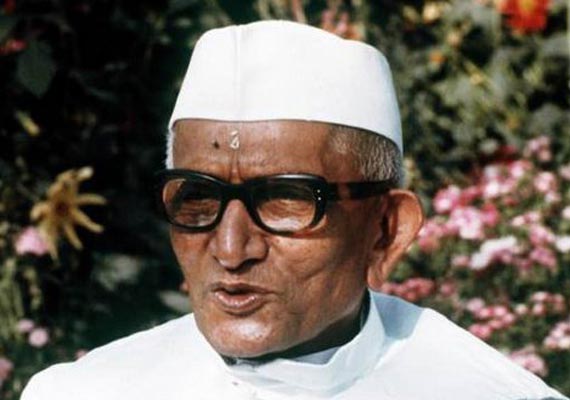
Morarji Desai (29 Feb 1896 - 10 April 1995), was a notable Indian independence activist and the fifth Prime Minister of India from 1977 - 1979. He was also the first Prime Minister to head India's first non-Congress Government. He held many important posts in the Government of India such as: Chief Minister of Bombay State, Home Minister, Finance Minister and Deputy Prime Minister of India. At foreign fronts, Desai holds international fame for his peace activism and made notable efforts to initiate peace between two-rival South Asian states, Pakistan and India. After India's first nuclear explosion in 1974, Desai helped restore friendly relations with China and Pakistan, and vowed to avoid armed conflict such as Indo-Pakistani war of 1971. Domestically, he played crucial role in Indian nuclear program after it was targeted by major nuclear powers after conducting a surprise test in 1974. Morarji Desai closed down much of India's premier intelligence agency Research and Analysis Wing (R&AW), and reduced its budget and operations.
 Morarji Desai indiscreetly told Pakistan's Chief Martial Law Administrator General Zia ul-Haq that his government was well aware of Pakistan's nuclear development which prompted the Pakistani government in removing all spies from around its nuclear research facilities and thus finally being successful in its nuclear dream. Desai was the only Indian national to be conferred with Pakistan's highest civilian award, Nishan-e-Pakistan, which was conferred on him by President Ghulam Ishaq Khan in 1990 in a colorful ceremony. Later, his policies promoted social, health and administrative reforms in the country.
Morarji Desai indiscreetly told Pakistan's Chief Martial Law Administrator General Zia ul-Haq that his government was well aware of Pakistan's nuclear development which prompted the Pakistani government in removing all spies from around its nuclear research facilities and thus finally being successful in its nuclear dream. Desai was the only Indian national to be conferred with Pakistan's highest civilian award, Nishan-e-Pakistan, which was conferred on him by President Ghulam Ishaq Khan in 1990 in a colorful ceremony. Later, his policies promoted social, health and administrative reforms in the country.
DOB:23 December 1902/ DOD:29 May 1987(aged 84)
28 July 1979 to 14 January 1980 - 170 days
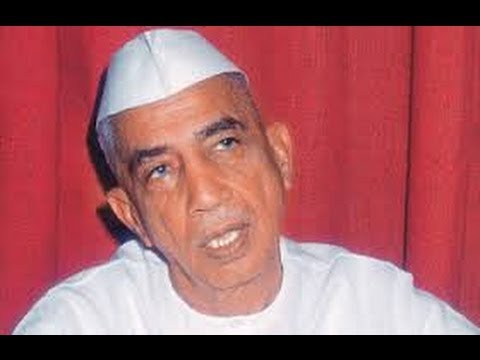
Charan Singh's ancestor was the prominent leader of the Indian Rebellion of 1857, Raja Nahar Singh of Ballabhgarh(in present day Haryana).Maharaja Nahar Singh was sent to the gallows in Chandni Chowk, Delhi.In order to escape the oppression from the British Government following their defeat, the Maharaja's followers, including Charan Singh's grandfather moved eastward to district Bulandshaher in Uttar Pradesh
 Charan Singh was born on 23 December 1902 in the village of Noorpur, Hapur, Uttar Pradesh. He was a good student, and received a Masters of Arts (MA) degree in 1925 and Law degree in 1926 from Agra University. He started practice as a Civil Lawyer at Ghaziabad in 1928.
Charan Singh was born on 23 December 1902 in the village of Noorpur, Hapur, Uttar Pradesh. He was a good student, and received a Masters of Arts (MA) degree in 1925 and Law degree in 1926 from Agra University. He started practice as a Civil Lawyer at Ghaziabad in 1928.
 In February 1937 he was elected Chhaprauli (Baghpat) to the Legislative Assembly of Uttar Pradesh (United Provinces) at the age of 34. In 1938 he introduced an Agricultural Produce Market Bill in the Assembly which was published in the issues of The Hindustan Times of Delhi dated 31 March 1938. The Bill was intended to safeguard the interests of the farmers against the rapacity of the traders. The Bill was adopted by most of the States in India, Punjab being the first state to do so in 1940.
In February 1937 he was elected Chhaprauli (Baghpat) to the Legislative Assembly of Uttar Pradesh (United Provinces) at the age of 34. In 1938 he introduced an Agricultural Produce Market Bill in the Assembly which was published in the issues of The Hindustan Times of Delhi dated 31 March 1938. The Bill was intended to safeguard the interests of the farmers against the rapacity of the traders. The Bill was adopted by most of the States in India, Punjab being the first state to do so in 1940.
 Charan Singh followed Mahatma Gandhi in non-violent struggle for independence from the British Government, and was imprisoned several times. In 1930, he was sent to jail for 6 months by the British for contravention of the salt laws. He was jailed again for one year in November 1940 for individual Satyagraha Movement. In August 1942 he was jailed again by the British under DIR and released in November 1943.
Charan Singh followed Mahatma Gandhi in non-violent struggle for independence from the British Government, and was imprisoned several times. In 1930, he was sent to jail for 6 months by the British for contravention of the salt laws. He was jailed again for one year in November 1940 for individual Satyagraha Movement. In August 1942 he was jailed again by the British under DIR and released in November 1943.
DOB:Rajiv(Sharma)Gandhi 20 August 1944 / DOD:21 May 1991(aged 46)
31 October 1984 to 2 December 1989 - 5 years, 32 days
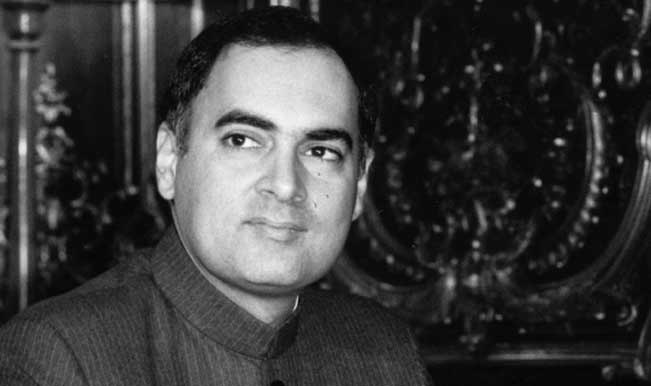
Rajiv Ratna Gandhi (20 August 1944 - 21 May 1991) was the seventh Prime Minister of India, serving from 1984 to 1989. He took office after the 1984 assassination of Prime Minister Indira Gandhi, his mother, to become the youngest Indian prime minister.

Ascion of the politically powerful Nehru-Gandhi family associated with the Indian National Congress party, for much of Rajiv's childhood his Maternal grandfather Jawaharlal Nehru was prime minister. For his college education, he went to Britain where he met and began dating Antonia Maino, an Italian waitress. Rajiv returned to India in 1966 and became a professional pilot for the state-owned Indian Airlines. In 1968, he married Maino-who changed her name to Sonia Gandhi-and the couple settled down in Delhi to a domestic life with their children Rahul and Priyanka. Although for much of the 1970s his mother was prime minister, and his brother Sanjay wielded significant unofficial power, Rajiv remained apolitical. After Sanjay's death in a plane crash in 1980, Rajiv reluctantly entered politics at the behest of Indira. The following year he won his brother's Amethi seat and became a member of the Lok Sabha (the lower house of Parliament). As part of his political grooming, Rajiv was made a general secretary of the Congress and given significant responsibility in organising the 1982 Asian Games

On the morning of 31 October 1984, his mother was assassinated by her Sikh bodyguards to avenge Operation Blue Star; later that day, Rajiv Gandhi was appointed Prime Minister. His leadership was put to the test over the next few days as organised mobs rioted against the Sikh community, resulting in the death of thousands in Delhi alone. Nevertheless, that December, a nationwide sympathy vote for Rajiv's Congress party helped it win the greatest Lok Sabha majority (411 seats out of 542) in history.

Rajiv Gandhi was also mired in many controversies: the 1984 anti-Sikh riots, Bhopal disaster and Shah Bano case. In 1988, Gandhi reversed the coup in Maldives antagonising militant Tamil groups such as PLOTE. He was also responsible for first intervening and then sending Indian Peace Keeping Force troops for peace efforts in Sri Lanka in 1987, which soon ended in open conflict with the Liberation Tigers of Tamil Eelam (LTTE). In mid-1987, the Bofors scandal damaged his honest, corruption-free image and resulted in a major defeat for his party in the 1989 elections.

Rajiv Gandhi remained Congress President until the elections in 1991. While campaigning for the elections, he was assassinated by a suicide bomber from the LTTE. His widow Sonia became the president of Congress party in 1998, and led the party to victory in the 2004 and 2009 parliament elections. His son Rahul is a Member of Parliament and Vice President of the Congress. In 1991, Rajiv Gandhi was posthumously awarded the Bharat Ratna, the highest civilian award, by the government of India.
DOB:25 June 1931 / DOD:27 November 2008(aged 77)
2 December 1989 to 10 November 1990 - 343 days

Vishwanath Pratap Singh (25 June 1931 - 27 November 2008), Indian politician and government official, was the eighth Prime Minister of India (1989-90) and the 41st nominal Raja Bahadur (ruler) of the northern kingdom of Manda.
 Vishwanath Pratap Singh is known for trying to improve the lot of India's lower castes in his short term as Prime Minister. Singh was renowned for his obsession with honesty and his willingness to sacrifice office.Singh was born in the Rajput zamindar (traditional landlord) family ruling the kingdom of Manda on 25 June 1931.He obtained his education from Colonel Brown Cambridge School, Dehra Dun and studied at Allahabad and Pune(Poona)universities.
Vishwanath Pratap Singh is known for trying to improve the lot of India's lower castes in his short term as Prime Minister. Singh was renowned for his obsession with honesty and his willingness to sacrifice office.Singh was born in the Rajput zamindar (traditional landlord) family ruling the kingdom of Manda on 25 June 1931.He obtained his education from Colonel Brown Cambridge School, Dehra Dun and studied at Allahabad and Pune(Poona)universities.
Singh became a Member of the Legislative Assembly of Uttar Pradesh in 1969 as a member of the Indian National Congress (Congress Party). He won election to the Lok Sabha in 1971 and was appointed a Deputy Minister of Commerce by Prime Minister Indira Gandhi in 1974. He served as the Minister of Commerce in 1976-77.

He was appointed by Indira Gandhi as the Chief Minister of Uttar Pradesh in 1980, when Gandhi was re-elected after the Janata interlude.As Chief Minister (1980-82), he cracked down hard on dacoitry, a problem that was particularly severe in the rural districts of the south-west Uttar Pradesh. He received much favorable national publicity when he offered to resign following a self-professed failure to stamp out the problem, and again when he personally oversaw the surrender of some of the most feared dacoits of the area in 1983.
 He resumed his post as Minister of Commerce in 1983.
He resumed his post as Minister of Commerce in 1983.
DOB: 1 July 1927/ DOD:8 July 2007(aged 80)
10 November 1990 to 21 June 1991 - 223 days
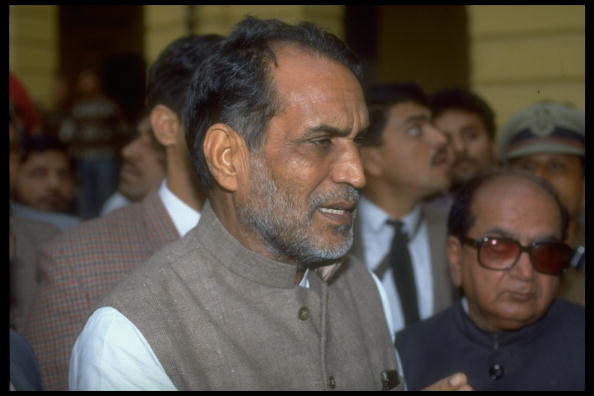
Chandra Shekhar Singh was born on 1 July 1927 in Bhumihar Brahmin family in Ibrahimpatti, a village in the Ballia district of Uttar Pradesh. He was awarded a Bachelor of Arts (graduate) degree at Satish Chandra P.G. College, and a postgraduate degree from Allahabad University. He was known as a firebrand in student politics and started his political career with Dr. Ram Manohar Lohia. After graduation, he became active in socialist politics.He married Duja Devi.



DOB:28 June 1921 / DOD:23 December 2004(aged 83)
21 June 1991 to 16 May 1996 - 4 years, 330 days
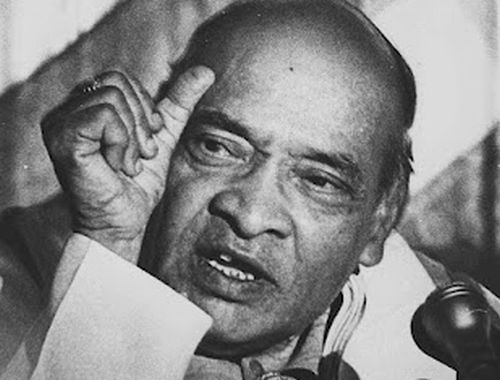
Pamulaparti Venkata Narasimha Rao (28 June 1921 - 23 December 2004) was an Indian lawyer and politician who served as the tenth Prime Minister of India (1991-1996).His ascendancy to the prime ministership was politically significant in that he was the first holder of this office from non-Hindi-speaking south India. He led an important administration, overseeing a major economic transformation and several home incidents affecting national security of India.Rao who held the Industries portfolio was personally responsible for the dismantling of the Licence Raj as this came under the purview of the Ministry of Commerce and Industry.He is often referred to as the "Father of Indian Economic Reforms".Future prime ministers Atal Bihari Vajpayee and Manmohan Singh continued the economic reform policies pioneered by Rao's government. Rao accelerated the dismantling of the License Raj, reversing the socialist policies of Rajiv Gandhi's government. He employed Dr. Manmohan Singh as his Finance Minister to embark on historic economic transition. With Rao's mandate, Dr. Manmohan Singh launched India's globalisation angle of the reforms that implemented the International Monetary Fund (IMF) policies to rescue the almost bankrupt nation from economic collapse.Rao was also referred to as Chanakya for his ability to steer tough economic and political legislation through the parliament at a time when he headed a minority government.
 According to Natwar Singh, "Unlike Nehru his knowledge of Sanskrit was profound. Nehru had a temper, PV a temperament. His roots were deep in the spiritual and religious soil of India. He did not need to Discover India". 11th President of India APJ Abdul Kalam described Rao as "patriotic statesman who believed that the nation is bigger than the political system". Kalam acknowledged that Rao in fact asked him to get ready for nuclear tests in 1996 but it was not carried out as government at center got changed due to 1996 general election and it was later carried out by Vajpayee led NDA government. In fact Rao briefed Vajpayee on nuclear plans.
According to Natwar Singh, "Unlike Nehru his knowledge of Sanskrit was profound. Nehru had a temper, PV a temperament. His roots were deep in the spiritual and religious soil of India. He did not need to Discover India". 11th President of India APJ Abdul Kalam described Rao as "patriotic statesman who believed that the nation is bigger than the political system". Kalam acknowledged that Rao in fact asked him to get ready for nuclear tests in 1996 but it was not carried out as government at center got changed due to 1996 general election and it was later carried out by Vajpayee led NDA government. In fact Rao briefed Vajpayee on nuclear plans.
 Rao's term as Prime Minister was an eventful one in India's history. Besides marking a paradigm shift from the industrialising, mixed economic model of Jawaharlal Nehru to a market driven one, his years as Prime Minister also saw the emergence of the Bharatiya Janata Party (BJP), a major right-wing party, as an alternative to the Indian National Congress which had been governing India for most of its post-independence history. Rao's term also saw the destruction of the Babri Mosque in Ayodhya in Uttar Pradesh when BJP's Kalyan Singh was CM which triggered one of the worst Hindu-Muslim riots in the country since its independence.Rao died in 2004 of a heart attack in New Delhi. He was cremated in Hyderabad.He was a versatile personality with interests in a variety of subjects (other than politics) such as literature and computer software (including computer programming).He spoke 17 languages.
Rao's term as Prime Minister was an eventful one in India's history. Besides marking a paradigm shift from the industrialising, mixed economic model of Jawaharlal Nehru to a market driven one, his years as Prime Minister also saw the emergence of the Bharatiya Janata Party (BJP), a major right-wing party, as an alternative to the Indian National Congress which had been governing India for most of its post-independence history. Rao's term also saw the destruction of the Babri Mosque in Ayodhya in Uttar Pradesh when BJP's Kalyan Singh was CM which triggered one of the worst Hindu-Muslim riots in the country since its independence.Rao died in 2004 of a heart attack in New Delhi. He was cremated in Hyderabad.He was a versatile personality with interests in a variety of subjects (other than politics) such as literature and computer software (including computer programming).He spoke 17 languages.
DOB:25 December 1924(age 90)
16 May 1996 to 1 June 1996 - 13 days
19 March 1998 to 22 May 2004 - 6 years, 64 days
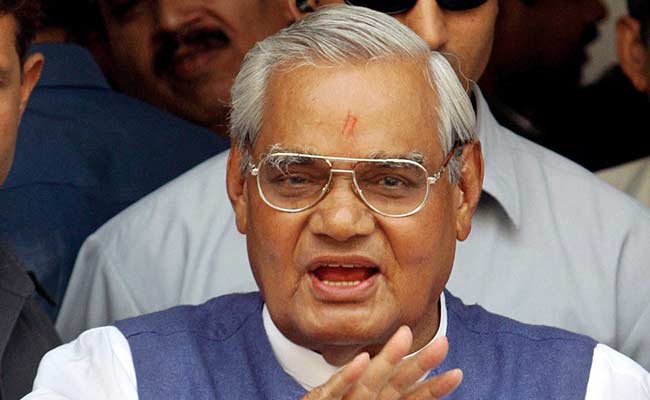
Atal Bihari Vajpayee (born 25 December 1924) is an Indian statesman who was the eleventh Prime Minister of India, first for 13 days in 1996 and then from 1998 to 2004. A leader of the Bharatiya Janata Party (BJP), he is the first Prime Minister from outside the Indian National Congress party to serve a full five-year term.

A parliamentarian for over four decades, Vajpayee was elected to the Lok Sabha (the lower house of India's Parliament) nine times, and twice to the Rajya Sabha (upper house). He also served as the Member of Parliament for Lucknow, Uttar Pradesh, until 2009, when he retired from active politics due to health concerns. Vajpayee was one amongst the founder members of erstwhile Bharatiya Jana Sangh, which he had also headed. He was also the Minister of External Affairs in the cabinet of Morarji Desai. When Janata government collapsed, Vajpayee restarted the Jana Sangh as the Bharatiya Janata Party in 1980.
 On 25 December 2014 the office of President of India announced the Bharat Ratna award, India's highest civilian honour, to Vajpayee. His birthday, 25 December, was declared "Good Governance Day".
On 25 December 2014 the office of President of India announced the Bharat Ratna award, India's highest civilian honour, to Vajpayee. His birthday, 25 December, was declared "Good Governance Day".
DOB:18 May 1933(age 81)
1 June 1996 to 21 April 1997 - 324 days
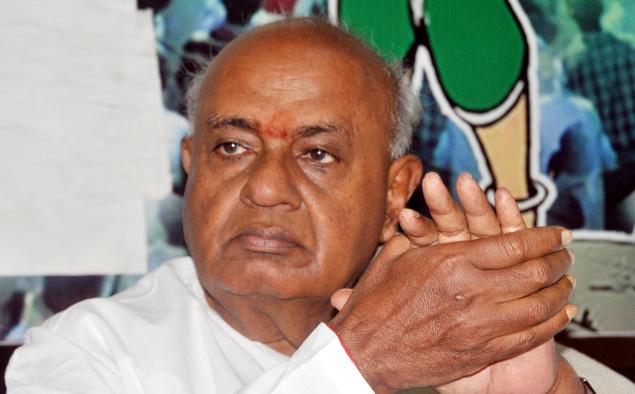
Haradanahalli Doddegowda Deve Gowda(born 18 May 1933)is an Indian politician who was the 12th Prime Minister of India from June 1996 to April 1997.Previously he was the 14th Chief Minister of Karnataka from 1994 to 1996.

He is a member of the 16th Lok Sabha representing the Hassan constituency of Karnataka, is the National President of the Janata Dal (Secular) party, and enjoys strong support in Vokkaliga community which is at the forefront of the state politics.Deve Gowda was born on 18 May 1933 in Haradanahalli village of Holenarasipura taluk, Hassan District, Karnataka. He earned his Diploma in Civil Engineering from Smt. L. V. Polytechnic, Hassan, Karnataka. He married Chennamma and the couple have four sons and two daughters.

His parents, Dodde Gowda and Devamma, were from a middle-class agricultural background.Hence, he was exposed to the hardships of farmers early in his life and later became a champion of the farmers' cause.
DOB: 4 December 1919
21 April 1997 to 19 March 1998 - 332 days

Inder Kumar Gujral (4 December 1919 - 30 November 2012) was an Indian politician who served as the thirteenth Prime Minister of India from April 1997 to March 1998. Gujral was the third PM to be from the Rajya Sabha, the first being Indira Gandhi and the second H. D. Deve Gowda
 Inder Kumar Gujral was born on 4 December 1919 to Avtar Narain and Pushpa Gujral in Jhelum in present day Pakistan. He studied at D.A.V. College, Hailey College of Commerce and Forman Christian College University, Lahore. He also participated in the Indian independence movement and was jailed in 1942 during the Quit India Movement.As a student he became a member of the Communist Party of India.He also has two sisters named uma nanda and sunita judge.
Inder Kumar Gujral was born on 4 December 1919 to Avtar Narain and Pushpa Gujral in Jhelum in present day Pakistan. He studied at D.A.V. College, Hailey College of Commerce and Forman Christian College University, Lahore. He also participated in the Indian independence movement and was jailed in 1942 during the Quit India Movement.As a student he became a member of the Communist Party of India.He also has two sisters named uma nanda and sunita judge.
 Gujral's hobbies included poetry and he spoke Urdu and was, after his death, eulogised as a lover of the language by Maulana Azad National Urdu University, an institution where he held the position of chancellor.His wife Sheila Gujral, who had been ill, died on 11 July 2011. She was an acclaimed poet. The couple had two sons, Naresh, who is a Shiromani Akali Dal MP in the Rajya Sabha,and Vishal. The couple also have two granddaughters and a grandson. Gujral's brother, Satish Gujral, is a painter. His niece, Medha, is married to popular Bhajan singer Anup Jalota.
Gujral's hobbies included poetry and he spoke Urdu and was, after his death, eulogised as a lover of the language by Maulana Azad National Urdu University, an institution where he held the position of chancellor.His wife Sheila Gujral, who had been ill, died on 11 July 2011. She was an acclaimed poet. The couple had two sons, Naresh, who is a Shiromani Akali Dal MP in the Rajya Sabha,and Vishal. The couple also have two granddaughters and a grandson. Gujral's brother, Satish Gujral, is a painter. His niece, Medha, is married to popular Bhajan singer Anup Jalota.
DOB:26 September 1932(age 82)
22 May 2004 to 26 May 2014 - 10 years, 4 days
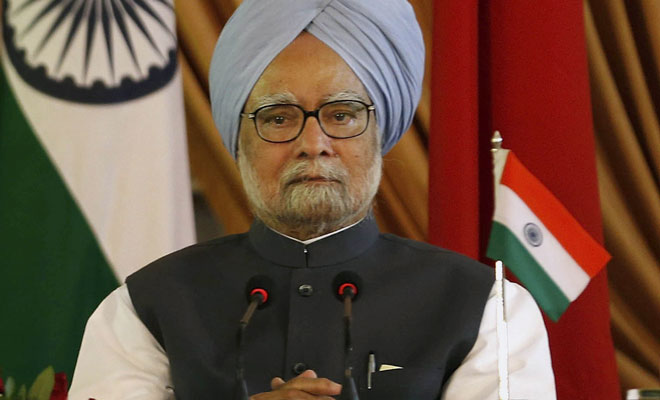
Manmohan Singh( born 26 September 1932)is an Indian economist who served as the 14th Prime Minister of India from 2004 to 2014. The first Sikh in office, Singh was the first prime minister since Jawaharlal Nehru to be re-elected after completing a full five-year term.

Born in Gah (now in Punjab, Pakistan), Singh's family migrated to India during its partition in 1947. After obtaining his doctorate in economics from Oxford, Singh worked for the United Nations in 1966-69. He subsequently began his bureaucratic career when Lalit Narayan Mishra hired him as an advisor in the Ministry of Foreign Trade. Over the 70s and 80s, Singh held several key posts in the Government of India, such as Chief Economic Advisor (1972-76), Reserve Bank governor (1982-85) and Planning Commission head (1985-87).

In 1991, as India faced a severe economic crisis, newly elected Prime Minister P. V. Narasimha Rao surprisingly inducted the apolitical Singh into his cabinet as Finance Minister. Over the next few years, despite strong opposition, he as a Finance Minister carried out several structural reforms that liberalised India's economy. Although these measures proved successful in averting the crisis, and enhanced Singh's reputation globally as a leading reform-minded economist, the incumbent Congress party fared poorly in the 1996 general election. Subsequently, Singh served as Leader of the Opposition in the Rajya Sabha (the upper house of India's Parliament) during the Atal Bihari Vajpayee government of 1998-2004.

In 2004, when the Congress-led United Progressive Alliance (UPA) came to power, its chairperson Sonia Gandhi unexpectedly relinquished the premiership to Manmohan Singh. This Singh-led "UPA I" government executed several key legislations and projects, including the Rural Health Mission, Unique Identification Authority, Rural Employment Guarantee scheme and Right to Information Act. In 2008, opposition to a historic civil nuclear agreement with the United States nearly caused Singh's government to fall after Left Front parties withdrew their support. Although India's economy grew rapidly under UPA I, its security was threatened by several terrorist incidents (including the 2008 Mumbai attacks) and the continuing Maoist insurgency.
The 2009 general election saw the UPA return with an increased mandate, with Singh retaining the office of Prime Minister. Over the next few years, Singh's "UPA II" government faced a number of corruption charges-over the organisation of the Commonwealth Games, the 2G-spectrum allocation and the allocation of coal blocks. Singh did not contest the 2014 general election.
DOB:Narendra Damodardas Modi 17 September 1950 (age 64)
Current Prime Minister - since 26 May 2014
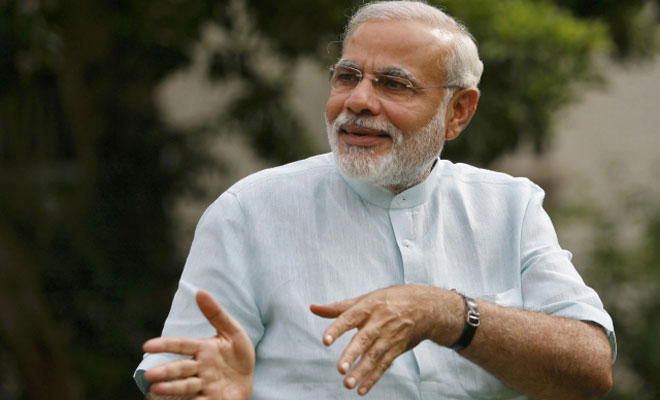
Narendra Damodardas Modi born 17 September 1950) is the 15th and current Prime Minister of India, in office since 26 May 2014.Modi, a leader of the Bharatiya Janata Party (BJP), was the Chief Minister of Gujarat from 2001 to 2014 and is the Member of Parliament (MP) from Varanasi. He led the BJP in the 2014 general election, which gave the party a majority in the Lok Sabha (the lower house of the Indian parliament) -a first for any party since 1984 - and was credited for October 2014 BJP electoral victories in the states of Haryana and Maharashtra.

The prime minister, a Hindu nationalist, is a member of the Rashtriya Swayamsevak Sangh (RSS)and is a controversial figure domestically and internationally; his administration was criticised for its failure to prevent the 2002 Gujarat riots. Although Modi's economic policies (credited with encouraging economic growth in Gujarat) have been praised,his administration has also been criticised for failing to significantly improve the state's human development.



